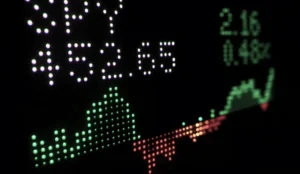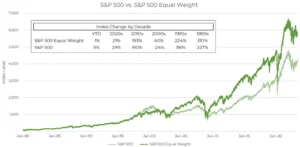Second quarter earnings on the S&P 500 were record-breaking, representing a 9.9% year-over-year increase. Third quarter earnings growth is expected to slow but remain 4.3% higher than 3Q 2021. (1) Despite earnings strength, rising interest rates, geopolitical uncertainty, and recession talk have tested markets and investor patience.
It seems long ago that the summer rally lifted the S&P 500 14.7% from June 17th lows. (2) Investors thought signs of slowing inflation may lead the Federal Reserve down a more cautionary path. That door was slammed shut on August 26th after Jerome Powell, invoking famed Chairman Paul Volcker, delivered an unusually short speech focused on curtailing inflation through “forceful and rapid steps.” Volcker is known for his aggressive stance toward inflation in the 1980s. Powell concluded his remarks by ensuring the Fed would “keep at it until we are confident the job is done.” Paul Volcker’s autobiography is coincidentally titled Keeping At It.
Given the market’s reaction to Powell’s referencing Paul Volcker, we thought it instructive to look at the period surrounding Volcker’s term as Fed Chairman.
History
1970 through the end of 1989 saw Vietnam, Watergate, the Tehran hostage crisis, Iran-Contra, a gas shortage, and multiple bouts of high inflation. Over these 20 years, inflation rose 6.2% annually, peaking at 14.8% in 1980. (3)
Meanwhile, S&P 500 earnings grew 7.2% per year. S&P 500 stocks returned 11.4% annually, representing an inflation-adjusted return of 5.2%. (4) In other words, investors that moved to cash saw their purchasing power decrease 6.2% per year. By contrast, those who remained invested increased their purchasing power 5.2% per year after inflation.
Put yet another way, the investor starting 1970 with $100 in cash who did not invest saw their purchasing power decrease to $27.80 by 1990. The investor who left $100 in the S&P 500 saw their purchasing power grow to $275.62, net of inflation.

Conclusion
We recall three principles amidst in the current environment:
First, the balance sheets of our holdings remain sound. This provides the bedrock for investment in future growth and ongoing dividend stability.
Second, quality, cash flow-generating businesses are better able to maintain margins and increase dividends. This helps investors keep up with inflation and makes those companies’ stocks less sensitive to interest rates.
Third, history is on our side—dividend-paying equities remain the best long-term inflation hedge despite periods of short-term volatility.
Volatility may continue in the near-term. But if history is any indication, world events, interest rate concerns, and inflationary environments often present long-term investment opportunities.
Services offered through JGP Wealth Management, LLC, a Registered Investment Adviser. This commentary in this email reflects the personal opinions, viewpoints and analyses of the JGP Wealth Management, LLC employees providing such comments, and should not be regarded as a description of advisory services provided by JGP Wealth Management, LLC or performance returns of any JGP Wealth Management, LLC Investments client. The views reflected in the commentary are subject to change at any time without notice. JGP Wealth Management, LLC manages its clients’ accounts using a variety of investment techniques and strategies, which are not necessarily discussed in the commentary. Investments in securities involve the risk of loss. Past performance is no guarantee of future results. No advice may be rendered by JGP Wealth Management, LLC unless a client service agreement is in place. Please contact us at your earliest convenience with any questions regarding the content of this presentation and how it may be the right strategy for you. For actual results that are compared to an index, all material facts relevant to the comparison are disclosed herein and reflect the deduction of advisory fees, brokerage and other commissions and any other expenses paid by JGP Wealth Management, LLC’s clients. An index is a hypothetical portfolio of securities representing a particular market or a segment of it used as indicator of the change in the securities market. Indexes are unmanaged, do not incur fees and expenses and cannot be invested in directly.
______________
(1) Yardeni Research
(2) June 17, 2022, through June 25, 2022, the day before Fed Chairman Jerome Powell’s speech.
(3) Stata: St. Louis Federal Reserve
(4) Robert Shiller Data Sets







